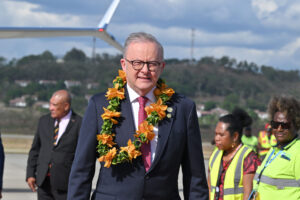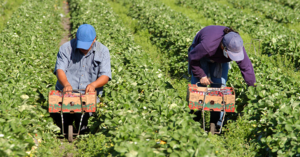by Richie Merzian
[Oringinally published in The Canberra Times, 27 July 2019]
The single greatest threat to Australia and the Pacific is climate change. But given Australia’s actions over the last 12 months, you wouldn’t know it. The Australian government is only willing to pay lip service to what addressing that threat requires: serious climate action.
Australia should not underestimate the importance of taking climate action – particularly in the Pacific where, just yesterday, Pacific islands ministers met and reiterated the need for climate action in the region. As the UN Secretary-General, Antonio Guterres, said: “If you can save Tuvalu you can save the world.”
Foreign Minister Marise Payne (right) with Prime Minister Scott Morrison. Ms Payne has said Pacific nations “should be pleased” with Australia’s efforts to combat climate change. Picture: Alex Ellinghausen
But Australia is all talk, no climate action, and our recalcitrance on climate action is doing real damage. The Australian government is acutely aware of its waning influence in the Pacific region; in response, it has doubled down on announcements through a Pacific Step Up program, increased bilateral visits to the region by the Prime Minister and revamped the Office of the Pacific. But at the end of the day you can’t “step up” in the Pacific while stepping back on climate action.
Additionally, Australia has all but stopped foreign aid for climate action. $300 million of dedicated climate finance for the Pacific wraps up this financial year, as does Australia’s overarching commitment of $1 billion for climate finance, announced at the Paris climate summit. The climate finance pipeline will soon run dry, but that didn’t stop Foreign Minister Marise Payne talking up these past aid programs to defend Australia’s climate credentials, in an aim to brush off the Pacific’s calls that Australia isn’t doing enough.
By next year, Australia will join the Scrooge McDuck club for the stingiest developed nations – those giving less than 0.2% of our gross national income to foreign aid. Less than a decade ago Australia was on track to hit 0.5% of national income. The United Kingdom, despite its current dramas, has maintained its target of 0.7% of national income spent on aid, and earlier this month committed £14 billion to their overseas aid budget to spend on the transition to a low-carbon economy and urge other countries to adopt more ambitious emissions targets.
Australia hasn’t always been the laggard of climate action in the Pacific. It was instrumental in the development of the Green Climate Fund (GCF), which is a key body under the Paris Agreement to support climate action in developing countries. Australia contributed $200 million, but more importantly was intimately involved in the design and management of the fund. Most significantly, the fund was led by DFAT official Ewen McDonald, who remains the longest serving chairman of the GCF board.
Australia’s number one priority on the GCF was to ensure funding flowed to the Pacific region, and by the time Australia stepped down from co-chairing, eight Pacific countries had attracted over $400 million in investments in climate action – more than double Australia’s contribution to the GCF!
Villagers from Tebunginako, on the Pacific island of Abaiang in Kiribati, have had to relocate because of rising seas. Picture: Justin McManus
And while our former prime minister Tony Abbott was adept at shock-jock diplomacy – denigrating the UN climate conference as “socialism, masquerading as environmentalism” – our current Prime Minister has it mastered. Prime Minister Scott Morrison pulled the plug on one of Australia’s most successful diplomatic ventures on climate change in one fell interview, stating that Australia would not “tip” any more money into “all that sort of nonsense”.
But the Prime Minister apparently blindsided DFAT and the Foreign Minister as much as it did the Pacific. Now, with Australia pulling out of the fund, Australia will lose its seat on the board, leaving the GCF without a voice to the Pacific region.
Shorting the Pacific on climate finance is just the half of it. Australia’s emissions reduction target is not in line with the Paris Agreement’s goal of limiting global warming to 1.5 degrees. Not only is Australia’s target too low, but we’re the only industrialised country that insists on using a dodgy loophole – carbon credits accrued from the Kyoto Protocol – to reduce our obligations.
So dodgy is this process that it was ruled out by the United Kingdom, New Zealand, Germany and most other countries. According to Australia Institute research, the Kyoto carbon credits amount to 367 million tonnes, which is seven times bigger than the annual emissions from New Zealand and Pacific nations combined.
Using Kyoto carbon credits from a decade ago would let Australia off the hook for a majority of the emission reductions pledged under its Paris Agreement target. For Australia to argue that it is entitled to do that is like trying to use the gold star you got in kindergarten to get into university – it doesn’t add up.
Even with Australia’s weak target and the dodgy Kyoto carbon credits, the government will likely still miss hitting its Paris commitment because Australia’s annual emissions continue to go up, and up, and up – with no serious policies to turn it around.
Right now, there isn’t a single credible policy to curb emissions from sectors like transport and fossil fuel extraction. Nor is the government even interested in reining them in. Take Chevron, for example. Its liquefied natural gas facility, Gorgon in WA, promised to reduce its emissions through carbon capture and storage when it started operations in 2016. Every year since then Chevron has found an excuse to delay its emission cutting efforts.
In one year, the emissions from that project were as large as the total annual emissions of 12 Pacific island countries. That is entirely within the federal government’s abilities to rein in, but that would require climate action. And who needs action when you have lip service? According to Ms Payne this week, the Pacific “should be pleased” with Australia’s level of climate action.
The Secretary-General of the United Nations, Antonio Guterres, was recently in the Pacific garnering support to ramp up the UN’s climate efforts in time for a special climate summit on September 23. He has five climate priorities: “ambition, ambition, ambition, ambition and ambition” – and boy, will Australia struggle.
The summit is aimed at world leaders who will be in New York for the UN General Assembly. We know that the Prime Minister will be in the country, given his planned state dinner with President Trump three days before the summit.
If the Prime Minister skips out on the summit it would be poorly received by most leaders attending, but perhaps not unexpected, after former prime minister Tony Abbott’s snubbing of a similar UN climate summit in 2014. Like a dinner guest that shows up empty-handed, Ms Payne would have to fill in for the Prime Minister at the climate meeting, and would struggle to bring anything credible to the table.
A collective push for climate action is about to come from our Pacific neighbours. Countries like New Zealand, Fiji and the Marshall Islands are looking to increase their Paris Agreement commitments. Australia can join or be left behind.
- Richie Merzian is the climate & energy program director at independent think tank The Australia Institute. He is a former Australian government negotiator to the UN Framework Convention on Climate Change and helped co-ordinate the Green Climate Fund board during Australia’s tenure as chair. @RichieMerzian.
Between the Lines Newsletter
The biggest stories and the best analysis from the team at the Australia Institute, delivered to your inbox every fortnight.
You might also like
Pacific nations have just delivered Australia two smackdowns. That’s a big deal.
We need to talk about the Pacific.
Labor giving billion-dollar cost of COP to Pacific would show genuine climate leadership
The Australia Institute is calling on the Albanese Government to redirect the billion dollars saved by not hosting COP31 to Pacific nations.
A fair go for temporary workers from the Pacific
On a whistlestop tour of Fiji, Tonga, and Vanuatu in May, Foreign Minister Penny Wong wanted to focus on climate change, security, and aid funding.


